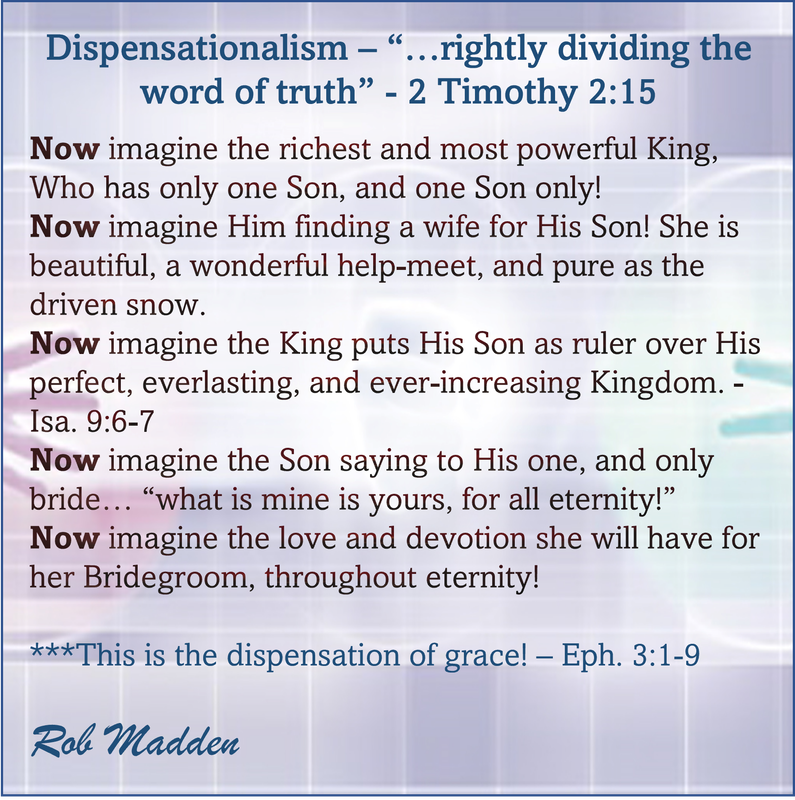Imagine the dispensation of grace!
Rob Madden
| the_great_lesson_of_dispensational_teaching.docx | |
| File Size: | 1414 kb |
| File Type: | docx |
Your browser does not support viewing this document. Click here to download the document.
What is dispensationalism and is it biblical?
A dispensation is a way of ordering things—an administration, a system, or a management. In theology, a dispensation is the divine administration of a period of time; each dispensation is a divinely appointed age. Dispensationalism is a theological system that recognizes these ages ordained by God to order the affairs of the world. Dispensationalism has two primary distinctives:
1) a consistently literal interpretation of Scripture, especially Bible prophecy, and
2) a view of the uniqueness of Israel as separate from the Church in God’s program. Classical dispensationalism identifies seven dispensations in God’s plan for humanity.
Dispensationalists hold to a literal interpretation of the Bible as the best hermeneutic. The literal interpretation gives each word the meaning it would commonly have in everyday usage. Allowances are made for symbols, figures of speech, and types, of course. It is understood that even symbols and figurative sayings have literal meanings behind them. So, for example, when the Bible speaks of “a thousand years” in Revelation 20, dispensationalists interpret it as a literal period of 1,000 years (the dispensation of the Kingdom), since there is no compelling reason to interpret it otherwise.
There are at least two reasons why literalism is the best way to view Scripture.
First, philosophically, the purpose of language itself requires that we interpret words literally. Language was given by God for the purpose of being able to communicate. Words are vessels of meaning.
The second reason is biblical. Every prophecy about Jesus Christ in the Old Testament was fulfilled literally. Jesus’ birth, ministry, death, and resurrection all occurred exactly as the Old Testament predicted. The prophecies were literal. There is no non-literal fulfillment of messianic prophecies in the New Testament. This argues strongly for the literal method. If a literal interpretation is not used in studying the Scriptures, there is no objective standard by which to understand the Bible. Each person would be able to interpret the Bible as he saw fit. Biblical interpretation would devolve into “what this passage says to me” instead of “the Bible says.” Sadly, this is already the case in much of what is called Bible study today.
Dispensational theology teaches that there are two distinct peoples of God: Israel and the Church. Dispensationalists believe that salvation has always been by grace through faith alone—in God in the Old Testament and specifically in God the Son in the New Testament. Dispensationalists hold that the Church has not replaced Israel in God’s program and that the Old Testament promises to Israel have not been transferred to the Church. Dispensationalism teaches that the promises God made to Israel in the Old Testament (for land, many descendants, and blessings) will be ultimately fulfilled in the 1000-year period spoken of in Revelation 20. Dispensationalists believe that, just as God is in this age focusing His attention on the Church, He will again in the future focus His attention on Israel (see Romans 9–11 and Daniel 9:24).
Dispensationalists understand the Bible to be organized into 7 dispensations:
1. Innocence (Genesis 1:1—3:7),
2. Conscience (Genesis 3:8—8:22),
3. Human Government (Genesis 9:1—11:32),
4. Promise (Genesis 12:1—Exodus 19:25),
5. Law (Exodus 20:1—Acts 2:4),
6. Grace (Acts 2:4—Revelation 20:3), and
7. The Millennial Kingdom (Revelation 20:4–6).
Again, these dispensations are not paths to salvation, but manners in which God relates to man. Each dispensation includes a recognizable pattern of how God worked with people living in the dispensation.
That pattern is...
1) a responsibility,
2) a failure,
3) a judgment, and
4) grace to move on.
Dispensationalism, as a system, results in a premillennial interpretation of Christ’s second coming and usually a pretribulational interpretation of the rapture. To summarize, dispensationalism is a theological system that emphasizes the literal interpretation of Bible prophecy, recognizes a distinction between Israel and the Church, and organizes the Bible into different dispensations or administrations.
1) a consistently literal interpretation of Scripture, especially Bible prophecy, and
2) a view of the uniqueness of Israel as separate from the Church in God’s program. Classical dispensationalism identifies seven dispensations in God’s plan for humanity.
Dispensationalists hold to a literal interpretation of the Bible as the best hermeneutic. The literal interpretation gives each word the meaning it would commonly have in everyday usage. Allowances are made for symbols, figures of speech, and types, of course. It is understood that even symbols and figurative sayings have literal meanings behind them. So, for example, when the Bible speaks of “a thousand years” in Revelation 20, dispensationalists interpret it as a literal period of 1,000 years (the dispensation of the Kingdom), since there is no compelling reason to interpret it otherwise.
There are at least two reasons why literalism is the best way to view Scripture.
First, philosophically, the purpose of language itself requires that we interpret words literally. Language was given by God for the purpose of being able to communicate. Words are vessels of meaning.
The second reason is biblical. Every prophecy about Jesus Christ in the Old Testament was fulfilled literally. Jesus’ birth, ministry, death, and resurrection all occurred exactly as the Old Testament predicted. The prophecies were literal. There is no non-literal fulfillment of messianic prophecies in the New Testament. This argues strongly for the literal method. If a literal interpretation is not used in studying the Scriptures, there is no objective standard by which to understand the Bible. Each person would be able to interpret the Bible as he saw fit. Biblical interpretation would devolve into “what this passage says to me” instead of “the Bible says.” Sadly, this is already the case in much of what is called Bible study today.
Dispensational theology teaches that there are two distinct peoples of God: Israel and the Church. Dispensationalists believe that salvation has always been by grace through faith alone—in God in the Old Testament and specifically in God the Son in the New Testament. Dispensationalists hold that the Church has not replaced Israel in God’s program and that the Old Testament promises to Israel have not been transferred to the Church. Dispensationalism teaches that the promises God made to Israel in the Old Testament (for land, many descendants, and blessings) will be ultimately fulfilled in the 1000-year period spoken of in Revelation 20. Dispensationalists believe that, just as God is in this age focusing His attention on the Church, He will again in the future focus His attention on Israel (see Romans 9–11 and Daniel 9:24).
Dispensationalists understand the Bible to be organized into 7 dispensations:
1. Innocence (Genesis 1:1—3:7),
2. Conscience (Genesis 3:8—8:22),
3. Human Government (Genesis 9:1—11:32),
4. Promise (Genesis 12:1—Exodus 19:25),
5. Law (Exodus 20:1—Acts 2:4),
6. Grace (Acts 2:4—Revelation 20:3), and
7. The Millennial Kingdom (Revelation 20:4–6).
Again, these dispensations are not paths to salvation, but manners in which God relates to man. Each dispensation includes a recognizable pattern of how God worked with people living in the dispensation.
That pattern is...
1) a responsibility,
2) a failure,
3) a judgment, and
4) grace to move on.
Dispensationalism, as a system, results in a premillennial interpretation of Christ’s second coming and usually a pretribulational interpretation of the rapture. To summarize, dispensationalism is a theological system that emphasizes the literal interpretation of Bible prophecy, recognizes a distinction between Israel and the Church, and organizes the Bible into different dispensations or administrations.
The subject of this dispensation is a group called "the church" or "the body of Christ." The Church is the mystery referred to in Eph. 3:3-9 and is so named because God had not revealed in the Old Testament that He was going to form such an organism, especially from both Jews and Gentiles. The New Testament tells us God's purpose in the Church is to gather a "people for His name" from all humanity, Jew and Gentile, in Jesus Christ to (among other things) become Christ's bride. "Whosoever will" can become a member of this living organism by simply repenting and by faith receiving the risen Jesus Christ into his heart. No works are required to obtain or keep this eternal salvation; all one must have is Jesus Christ in him. Christ has promised to freely come into and save all who will admit they are sinners, abandon all other means of salvation, and trust Him alone as Savior.
In this dispensation God is no longer dealing with man primarily as nations but as individuals. Every individual can have a personal relationship with God through the Lord Jesus Christ and he does not have to go through any priest or religious system to receive atonement for his sins. Israel, as a nation, has been placed on a "back burner" because of their blindness, but individual Jews can be saved just the same as Gentiles until this dispensation ends.
The "Church of God" is a distinct body from both Jews and Gentiles and has many blessings these two groups don't enjoy. God has poured many extremely rich blessings upon the saved of this dispensation that He has not given to those of any other. Even those saved in future dispensations do not have many of the precious treasures the Body of Christ has now. For example:
1. The new birth! (regeneration [Tit. 3:5, etc.]). There is no clear, biblical proof that the new birth is valid in any other dispensation.
2. A completed atonement! (described under the salvation doctrines propitiation and redemption [Heb. 9:12; 1 Jn. 2:2]). Until Christ's death salvation was "on credit."
3. Eternal and everlasting life that the believer cannot lose! (described under the salvation doctrines justification, adoption, reconciliation, imputation, etc. [John 3:16, 5:24; etc.])
4. Salvation by faith alone, no works at all required to obtain or keep it! (Eph 2:8-9; etc.).
5. The indwelling Holy Spirit who comforts, empowers, and seals believers! (Eph. 4:30).
6. A position in Christ's Body and Bride! (Eph. 5:30-32).
7. The promise of a supernatural body like Christ's resurrection body! (Phil. 3:21).
8. A future mansion in the New Jerusalem! (John 14:1-3).
Clearly, born again Christians, by no value of their own, have been given more blessings and promises than any other group of saved people, all by the good pleasure and pure grace of God. Why God selected this group to shower these amazing privileges on is fully known only by Him, but how much more should we who are saved and partake of them obey God's wishes with love & thanksgiving?
The obligation of believers during this dispensation is simple and direct. Each believer is to:
1. Evangelize by preaching the gospel of the grace of God to every creature (Matt. 28:19-20; Mark 16:15).
2. Be filled with the Holy Spirit and let Him direct his every thought and action (Gal. 5:16; Eph.5:18).
3. Present himself as a living sacrifice for God's service and separate himself from the world (Rom. 12:1-2).
Whether the believer obeys or disobeys these duties has nothing to do with his salvation, but disobedience will cost him rewards and crowns at the Judgment Seat of Christ where every believer will give account of himself to God (Rom. 14:10).
Even with the multitude of great blessings and privileges God has showered upon believers in Christ, this dispensation still ends in failure. Their failure was hinted at by Christ before the cross. He said when He returned the times would then be like the days of Noah thousands of years earlier (Matt. 24:37-39), characterized by unrestrained rebellion, wickedness, and apostasy. With all God has given believers in this present dispensation, they have again willingly refused to consistently do as He commanded.
Soon Christ will return and secretly take away all the Christians to Heaven and judgment and let the world continue, then even faster, toward its destiny of destruction.
In this dispensation God is no longer dealing with man primarily as nations but as individuals. Every individual can have a personal relationship with God through the Lord Jesus Christ and he does not have to go through any priest or religious system to receive atonement for his sins. Israel, as a nation, has been placed on a "back burner" because of their blindness, but individual Jews can be saved just the same as Gentiles until this dispensation ends.
The "Church of God" is a distinct body from both Jews and Gentiles and has many blessings these two groups don't enjoy. God has poured many extremely rich blessings upon the saved of this dispensation that He has not given to those of any other. Even those saved in future dispensations do not have many of the precious treasures the Body of Christ has now. For example:
1. The new birth! (regeneration [Tit. 3:5, etc.]). There is no clear, biblical proof that the new birth is valid in any other dispensation.
2. A completed atonement! (described under the salvation doctrines propitiation and redemption [Heb. 9:12; 1 Jn. 2:2]). Until Christ's death salvation was "on credit."
3. Eternal and everlasting life that the believer cannot lose! (described under the salvation doctrines justification, adoption, reconciliation, imputation, etc. [John 3:16, 5:24; etc.])
4. Salvation by faith alone, no works at all required to obtain or keep it! (Eph 2:8-9; etc.).
5. The indwelling Holy Spirit who comforts, empowers, and seals believers! (Eph. 4:30).
6. A position in Christ's Body and Bride! (Eph. 5:30-32).
7. The promise of a supernatural body like Christ's resurrection body! (Phil. 3:21).
8. A future mansion in the New Jerusalem! (John 14:1-3).
Clearly, born again Christians, by no value of their own, have been given more blessings and promises than any other group of saved people, all by the good pleasure and pure grace of God. Why God selected this group to shower these amazing privileges on is fully known only by Him, but how much more should we who are saved and partake of them obey God's wishes with love & thanksgiving?
The obligation of believers during this dispensation is simple and direct. Each believer is to:
1. Evangelize by preaching the gospel of the grace of God to every creature (Matt. 28:19-20; Mark 16:15).
2. Be filled with the Holy Spirit and let Him direct his every thought and action (Gal. 5:16; Eph.5:18).
3. Present himself as a living sacrifice for God's service and separate himself from the world (Rom. 12:1-2).
Whether the believer obeys or disobeys these duties has nothing to do with his salvation, but disobedience will cost him rewards and crowns at the Judgment Seat of Christ where every believer will give account of himself to God (Rom. 14:10).
Even with the multitude of great blessings and privileges God has showered upon believers in Christ, this dispensation still ends in failure. Their failure was hinted at by Christ before the cross. He said when He returned the times would then be like the days of Noah thousands of years earlier (Matt. 24:37-39), characterized by unrestrained rebellion, wickedness, and apostasy. With all God has given believers in this present dispensation, they have again willingly refused to consistently do as He commanded.
Soon Christ will return and secretly take away all the Christians to Heaven and judgment and let the world continue, then even faster, toward its destiny of destruction.
The Bible teaching concerning the Spirit may be divided into three general divisions:
(1) The Spirit according to the Old Testament;
(2) The Spirit according to the Gospels and as far in the Scriptures as The Acts 10:43;
(3) The Spirit according to the remainder of The Acts and the Epistles.
(1) The Spirit according to the Old Testament;
(2) The Spirit according to the Gospels and as far in the Scriptures as The Acts 10:43;
(3) The Spirit according to the remainder of The Acts and the Epistles.








